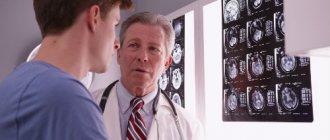Nausea and dizziness are typical symptoms
Dizziness and nausea
When during an attack, in addition to dizziness, the patient has nausea, the causes of this condition may be various diseases or age-related changes. In vestibular disorders, symptoms occur suddenly, usually when standing up. They go away on their own within 2 to 5 minutes.
This condition is also typical for alcohol or food intoxication of the body, and in addition to nausea, vomiting, fever and stool disorder may be present.
Dizziness and weakness
Dizziness and weakness usually occur with a rapid increase or decrease in blood pressure. If blood pressure is in the normal range, then the provoking causes may be diseases such as:
- anemia;
- impaired blood circulation in the brain;
- cardiovascular pathologies;
- psychosomatic disorders/psychological instability (consultation with a psychologist will help);
- cancer abnormalities (therapy is prescribed and treated by an oncologist).
- dizziness associated with nausea often appears in people who deliberately limit their food intake or eat extremely sparingly. In this case, the body does not receive enough nutrients.
Pain from dizziness
Painful sensations during dizziness can act as residual effects after injuries or damage to the skull. A similar condition occurs when watching TV for a long time, working or playing on the computer. In such situations, a temporary decrease in the level of vision and tearing are additionally observed. Also, this ailment can be caused by a number of diseases:
- osteochondrosis (treated by a neurologist);
- low blood pressure;
- borreliosis;
- brain tumors;
- migraine;
- pathologies of the middle ear (diagnosed and treated by ENT).
With long-term depression and severe emotional distress, the patient often experiences headaches for 1–2 days to several months.
Women feel dizzy after 30 years of age
In women over thirty years of age, this may appear in connection with pregnancy. This condition develops at the initial stage of fetal development and often persists until birth. The fact is that during the period of bearing a child, an active restructuring of all internal systems of the body occurs, which in turn provokes a deterioration in well-being, especially when the body position changes and during prolonged physical activity. Often the cause of dizziness is hormonal imbalances (consult an endocrinologist), a decrease in the level of hemoglobin in the blood (find out your norm by following the link), diabetes mellitus, cervical osteochondrosis, lack of vitamins (with a poor diet), unstable blood pressure.
Women feel dizzy after 40 years of age
The main factor in disorders in women over 40 years of age is menopause. During this period, the body is readjusting to another life phase, which causes frequent hot flashes and a feeling of constant weakness. Also, the reasons why dizziness at this age include:
- hypotension/hypertension;
- inflammatory diseases of the hearing organs;
- pathologies of the heart and blood vessels (diagnosed by a cardiologist);
- Meniere's disease;
- nervous overstrain (therapy will be prescribed by a neurologist);
- insomnia;
- avitaminosis;
- passive lifestyle.
Feeling dizzy when turning your head while lying down
If you periodically experience vertigo when turning your head in the “lying” position, you should contact a specialist for diagnosis, since this phenomenon most often appears in the presence of pathologies that require treatment. These include:
- blood pressure problems;
- osteochondrosis;
- Meniere's syndrome;
- brain tumors;
- diabetes;
- vegetative-vascular dystonia;
- traumatic brain injuries.
Feels dizzy and staggers when walking
If you feel dizzy and unsteady while walking, then this condition can be caused by many factors: illness, cerebellar tumors, vestibular disorders, gas poisoning, stress. In addition to the above symptoms, the patient often additionally has spasms in the occipital region, severe weakness, visual and speech disorders, and impaired coordination of movements.
Feeling dizzy when getting out of bed
Dizziness when getting out of bed is the most common. Additionally, the woman suddenly experiences an attack of severe weakness, instability, spotting in the eyes, bleeding from the nose and throbbing pain in the temples. This picture is typical for a number of cardiac, vascular, and musculoskeletal anomalies. Stress, low or, on the contrary, too high physical activity, poor nutrition, and bad habits have a negative impact on well-being and cause vertigo when getting up.
Why do you feel dizzy at normal blood pressure?
If you do not have problems with blood pressure, but you are often tormented by dizziness, pay attention to your physical and psychological state. Perhaps this symptom is caused by accumulated fatigue, lack of sleep, depression, improper daily routine and food intake, or taking certain medications that provoke this side effect. Also, dizziness with good pressure causes various pathologies, for example: curvature of the spinal column, labyrinthitis, gastrointestinal diseases, multiple sclerosis, brain tumors, etc. Then, additionally, headaches, convulsions, numbness of the limbs, nausea and other phenomena may occur.
What is dizziness?
True dizziness or vertigo is a condition during which patients have a feeling of rotation of surrounding objects around them or a false sensation of their own movement or rotation.
An example of true dizziness, but not in any way related to the disease, is the dizziness that appears in people after riding a carousel, when, after an abrupt stop, they continue to see the movement of surrounding objects relative to themselves, as if the carousel were still in motion.
In most cases, the occurrence of true dizziness is a symptom of diseases of the system of control of balance and body position in space. This system includes the eyes, the vestibular apparatus of the inner ear, and sensory receptors in the human muscles, joints, and bones. Very often, dizziness, which is caused by a disruption in the balance system, is accompanied by nausea and vomiting.
Main neurological causes
In the medical science of neurology, a large layer is devoted to the problem of the vestibular apparatus, since dizziness is most often due to damage to the nervous structures. Let's look at the main causes of dizziness, which are most often diagnosed in women:
Inflammation of the vestibular apparatus
Usually occurs as a complication of a viral infection. It mainly affects women aged 30-35 years. They suddenly develop severe dizziness, which is accompanied by sweating, palpitations, and general weakness. In such cases, an urgent consultation with an ENT doctor, a neurologist and the prescription of anti-inflammatory drugs are necessary.
Toxic effect of aminoglycoside antibiotics on the inner ear
Problems with visual perception may also occur during treatment with gentamicin, tobramycin, or kanamycin. Along with it, tinnitus and hearing loss may appear.
If symptoms of the toxic effects of antibiotics appear, you must stop taking the drugs and immediately consult your doctor, because such changes are irreversible.
Tumor or metastases in the cerebellum, vestibular nerve, brain stem
Unpleasant sensations in the head may be accompanied by a bursting headache, nausea, episodes of loss of consciousness, and impaired coordination of movements. If a tumor is suspected, the doctor performs an MRI or CT scan of the skull and refers the woman to an oncologist. If cancer has been detected, further tactics depend on the nature of the tumor and its location. Treatment uses chemotherapy, radiation therapy, and surgery.
Temporal lobe epilepsy
This is a special type of disruption of the cerebral cortex, in which the processes of excitation and inhibition change. With some periodicity, the temporal lobe cortex becomes overexcited and produces attacks of dizziness. It is accompanied by abdominal pain, drooling, sweating, and slow heart rate.
The main symptom of epilepsy is the seizure-like course of the disease. During a calm period, a woman feels completely healthy, but under the influence of some events or out of the blue she begins to feel dizzy. This pathology requires contacting a neurologist, who records brain activity on an EEG and prescribes appropriate treatment.
Migraine
One of the most mysterious types of headaches. It is called the “disease of geniuses”, since the relationship between a person’s outstanding mental abilities and painful attacks of the disease has long been noticed. With a migraine, the head may hurt in the forehead and eyes.
The woman needs consultation with a neurologist and treatment with anti-migraine drugs. To alleviate the condition of migraine patients, diets, physical exercises have been developed, massage and other relaxing procedures are recommended.
Encephalitis
This is an inflammation of the brain that affects the balance centers and the cerebellum. It is usually infectious in nature, but can also be toxic. If the cause is an infection, then the woman has pain and dizziness, severe weakness develops, body temperature rises to 38-40 degrees C, convulsions, blurred vision, and loss of consciousness are possible.
Encephalitis requires emergency hospitalization in a neurological or infectious diseases hospital.
Stroke
There is a sudden cessation of blood supply to an area of the brain. If the affected area is small and affects the centers of balance, then the woman’s only symptom will be dizziness. It is permanent, does not depend on the position of the body and head, the patient cannot move normally and maintain balance. Additional hearing loss or hearing loss may occur.
The patient requires emergency hospitalization in a neurological hospital. Therapy started within the first 2 hours after a stroke stops the death of nerve cells. The changes are partially reversible - a few months after the attack, the woman’s condition improves significantly.
Doctor's advice
There is a dietary supplement that works - Huato Boluses. Or the nootropic Divaza. This is something that has been tested on patients many times. It is taken either this or that (Divaza is cheaper) in a course (Divaza up to three months without a break, Huato Boluses are taken for 10 days, then a break is taken for one day and again for 10 days and so on up to three times) to prevent headaches, and not as an analgesic , i.e. in a moment of pain. Be healthy!
Victoria Druzhikina Neurologist, Therapist
Multiple sclerosis
This is an autoimmune disease in which the patient's antibodies attack her own nerve fibers and destroy them. The disease begins at a young age, is asymptomatic for some time, and then individual signs of trouble appear.
One of them may be constant dizziness, resistant to treatment and gradually progressing. A neurologist treats such patients; he prescribes drugs that suppress the activity of the immune system.
Lack of carbohydrates in the diet
Neurons require a huge amount of glucose to function, so women or athletes who are losing weight during the drying period may experience constant dizziness. In this case, it is necessary to increase the dose of carbohydrates until the condition normalizes.
Severe atherosclerosis of the vessels supplying the brain
This is one of the leading reasons why women over 50 feel dizzy. As a rule, menopause occurs during this period, and the level of the sex hormone estrogen in the blood decreases. It stops protecting the vascular wall from damage and lipid deposition, so after some time atherosclerotic plaques form in it.
The plaque bulges into the lumen of the vessel and significantly narrows it. Blood flows with difficulty, and the supply to the brain deteriorates, which is manifested by constant dizziness, tinnitus, headaches and blurred vision.
If such problems occur, you should consult a therapist who will prescribe medications to reduce the concentration of lipids in the blood and improve blood flow. Without treatment, atherosclerosis often results in a stroke.
Anemia
Anemia is a lack of hemoglobin in the blood and a decrease in its oxygen capacity. Oxygen is another essential component for the functioning of nerve cells; they absorb it intensively and in large quantities.
Even a slight decrease in oxygen concentration in the blood leads to drowsiness, increased fatigue and dizziness.
An anemic woman has pale skin and perverted taste preferences: she wants to eat raw meat, a piece of chalk or earth, she likes the smell of gasoline, lime, paint. Representatives of the fairer sex lose blood every month during menstruation and, if they do not receive enough iron from food in the form of meat, buckwheat, apples, anemia develops.
The listed symptoms are a reason to consult a general practitioner for examination and treatment.
VSD
VSD - vegetative-vascular dystonia develops for various reasons, including due to constant stress, physical. stress, mental suffering, etc. In addition to vertigo, patients often feel cold, as the circulatory system suffers, they get tired quickly and have problems sleeping.
Osteochondrosis
Osteochondrosis is a pathology that develops in people who spend a lot of time in a “sitting” position, due to which the neck is under constant tension and the vertebral vein is compressed between the cervical vertebrae. As a result, cerebral circulation is disrupted and less oxygen enters the brain, the lack of which leads to various disorders, including loss of stability and disorientation in space.
Multiple sclerosis
Multiple sclerosis is a disease characterized by the occurrence of attacks of varying duration, during which the patient experiences dizziness, unsteadiness of gait, instability, numbness of the limbs, difficulty urinating, etc.
PMS
PMS - heavy periods and lack of iron very often provoke dizziness in women. If you often encounter this problem, then visiting a gynecologist is simply necessary. The specialist will prescribe hormonal contraceptives or iron-containing vitamins to normalize well-being during PMS.
Severe stress
Severe stress - hard work, constant nervous and physical fatigue, family quarrels, mental trauma, etc. lead to a loss of vitality and general malaise of the body. The help of a psychologist will help you cope.
Pathology of the vestibular apparatus
Pathology of the vestibular apparatus is most common in women with underweight and develops at a young age (from 25 years). Patients are constantly sick in any type of transport; even ordinary rides on attractions end in a severe attack of vertigo.
Hypotension
Chronic hypotensive patients with low blood pressure begin to feel dizzy, especially with sudden movements, getting out of bed, or active physical work. The patient additionally experiences headaches, spots appear in the eyes, and vision deteriorates at the time of the attack.
Dizziness in pregnant women
Pregnancy is a completely new qualitative state of a woman, which is accompanied by significant changes in the body. The concentration of progesterone in the blood increases sharply: this sex hormone is necessary for bearing a fetus. It affects not only the uterus, but also the entire woman’s body.
Progesterone reduces pressure in arterial vessels, which reduces blood flow to the brain. In the early stages, he does not have time to adapt to new working conditions and sometimes reacts with headaches and dizziness.
A pregnant woman may feel dizzy for another reason, which also leads to partial starvation of the brain. The blood supply to the fetus requires a large volume of blood, so the amount of fluid in the mother’s vascular bed increases. In the early stages, it significantly dilutes hemoglobin, and the oxygen capacity of the blood decreases. The brain has to work in conditions of oxygen starvation, to which it immediately reacts. Subsequently, a healthy woman’s iron reserves are used, the release of red blood cells increases, and brain nutrition is improved.
Diagnostics
To find out the cause of dizziness, you need to see a therapist. The general practitioner will examine and interview the patient and outline an examination plan for him. If necessary, the patient will be referred to specialized specialists, such as a neurologist, otolaryngologist, endocrinologist, etc. If a stroke or cancer is suspected, the patient is urgently prescribed a CT or MRI of the brain.
The planned examination scheme includes:
- Donating blood for general and biochemical analysis.
- Donating blood to determine blood sugar levels.
- ECG of the heart.
The neurologist will conduct a series of tests with the patient aimed at assessing the functioning of the vestibular apparatus, and may prescribe an ultrasound scan of the vessels of the neck and brain. An otolaryngologist will evaluate the condition of the inner ear.
During the appointment, the patient must inform the doctor about what medications he is taking.
After a comprehensive examination, it will be possible to make the most accurate diagnosis and prescribe treatment.
First aid at home
There are several ways to relieve a short-term attack:
- ventilate the room;
- lie down on a flat surface, and it is recommended not to make sudden movements of the head;
- if possible, place a cool compress on your forehead;
- when in a public place, try to find a secluded corner to sit down, take a couple of sips of plain water, close your eyes and lightly press on your eyelids;
- after the attack has subsided, spend 5–10 minutes in a resting position; when getting up, do not make sudden movements, so as not to provoke a new wave of vertigo.
When urgent medical attention is needed
When vertigo appears along with symptoms such as:
- darkening of the eyes;
- stuffiness and pain in the ears;
- nausea;
- headaches;
- fainting;
- nosebleeds;
If you have had isolated attacks, or the unpleasant condition occurs systematically, then the only correct decision is to immediately consult a doctor. The doctor will conduct a diagnosis and identify the cause of the ailment, only then can we talk about prescribing the correct treatment.
Disease Prevention
It is not always necessary to carry out special drug treatment; sometimes it is enough to simply adjust your lifestyle. Prevention measures:
- watch your diet - food should be healthy, varied and balanced;
- try to give up bad habits;
- if your work involves a computer, take short breaks every hour to give your eyes a rest;
- walk outdoors more often;
- observe the rest and work schedule;
- after a hard day at work, take a cool shower to restore energy and relieve fatigue;
- Dedicate 10 to 15 minutes of free time every day to perform the exercise.
I note that not only antibiotics from the aminoglycoside group have a high ototoxic effect, but also cytostatics (Methotrexate) and anti-tuberculosis drugs. Aspirin is slightly less toxic to the organ of hearing and balance. Next to reduce possible harmful effects are loop diuretics (Lasix, ethacrynic acid), macrolides (Azithromycin, Clarithromycin) and fluoroquinolones (Ciprofloxacin), as well as painkillers (Indomethacin, Naproxen and Lidocaine). Taking the above medications may cause attacks of dizziness. If alarming symptoms appear, you should immediately consult a doctor.
Victoria Druzhikina
Neurologist, Therapist
Treatment methods
The patient must understand that dizziness is not an independent disease, but only a symptom of a particular pathology.
In order to get rid of it, it is necessary to influence the root cause of the violation:
- BPPV may require surgery to remove the otoliths from the inner ear. However, if they do not block his passages, then you can take a wait-and-see approach. Sometimes the disorder goes away on its own.
- For infections of the inner ear, the patient may be prescribed antibiotics to fight bacteria, corticosteroids to eliminate inflammation, and Diazepam to reduce the pathological activity of the central nervous system.
- For Meniere's disease, treatment should be aimed at eliminating pathological symptoms; the person is prescribed antiemetics or benzodiazepines. Patients receive diuretics on an ongoing basis.
- For migraines, the patient is prescribed antidepressants, anticonvulsants, and beta blockers. Analgesics and antihistamines can be used to relieve an attack.
- If a patient has anemia, then he needs to start eating right, enrich his menu with meat dishes, eggs, cottage cheese, fresh vegetables and fruits. It is possible to take iron supplements and B vitamins. In severe cases, the patient is advised to receive a transfusion of red blood cells.
- If low blood sugar leads to dizziness, then the patient needs to eat something sweet as quickly as possible. In severe cases, hospitalization is indicated. In the future, the patient will need to carefully monitor blood glucose levels.
Pathological conditions do not always lead to dizziness. To help yourself cope with an attack that was associated with emotional or physical fatigue, you first need to lie down. Before doing this, open the windows to allow fresh air into the room. You can apply a towel soaked in cool water to your forehead.
Be sure to measure your body temperature. If an attack of dizziness does not go away after 20-30 minutes, and a person’s condition worsens, then he needs to call an ambulance.
Video: Dr. Evdokimenko on methods of treating dizziness:
Popular medications on the topic
Cerebrolysin Cerebrolysate
For more information about the causes of dizziness, watch the video:
Diagnosis and treatment of dizziness is a difficult task even for an experienced doctor. In every case of a painful, prolonged or sudden attack, consultation with a specialist is required. Only he will determine what the patient should do next, what consultations and examinations she needs.
This article has been verified by a current qualified physician, Victoria Druzhikina, and can be considered a reliable source of information for site users.
Bibliography
1. https://kiberis.ru/?p=50203 2. https://nikio.ru/docs/02-golovokruzhenie1.pdf 3. https://docs.cntd.ru/document/901918942
Assess how much it was useful article
4.4 146 people voted, average rating 4.4
Did you like the article? Save it to your wall so you don’t lose it!








